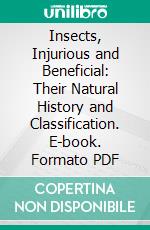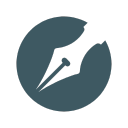Insects, Injurious and Beneficial: Their Natural History and Classification. E-book. Formato PDF - 9780259626435
di Matthew Cooke
edito da FORGOTTEN BOOKS , 2017
Formato: PDF - Protezione: nessuna
The spiders (arachnida) usually have the body divided into two distinct, regions (fig. The head and thorax being merged into one part; the thorax and abdomen are frequently con nected by a slender stem or petiole. They do not past through any changes or metamorphoses before reaching the adult state. So far as at present known, all spiders are predaceous, feeding upon insects, etc.; and one south-american Species, of very large size, is said to catch small birds by creeping up, and Springing upon them, like a cat. The Mites and Ticks differ from the Spiders in having the three parts of the body closely united, as the Yellow Mite (fig. There being no distinct line of separation between the thorax and the abdomen. The young Mites are generally provided with six legs (fig. Some kinds feed upon the leaves, etc., of various plants; others feed upon the eggs of insects or upon young plant lice such as the Phylloxera Mite (fig. And still others live parasitically upon different kinds of animals, such as the sheep Scab Mite (fig.
Ean
9780259626435
Titolo
Insects, Injurious and Beneficial: Their Natural History and Classification. E-book. Formato PDF
Autore
Editore
Data Pubblicazione
2017
Formato
PDF
Protezione
nessuna
Punti Accumulabili


